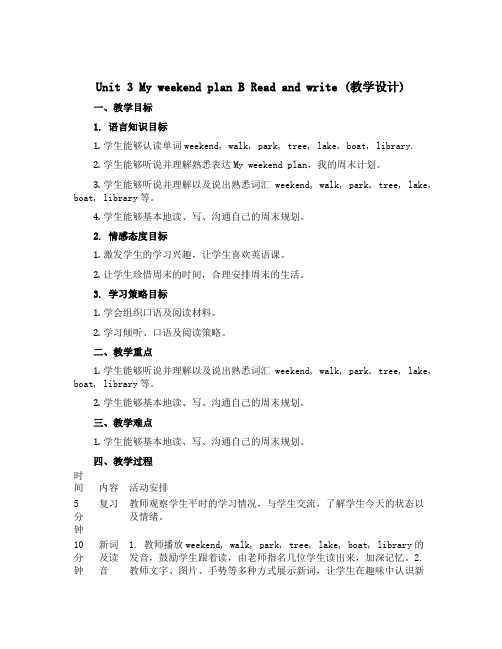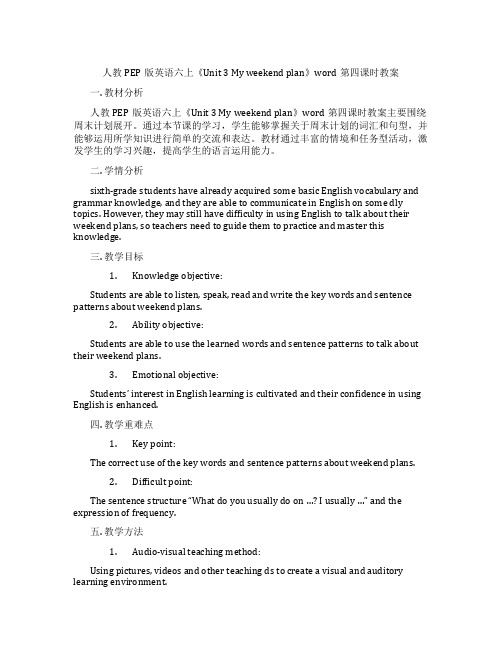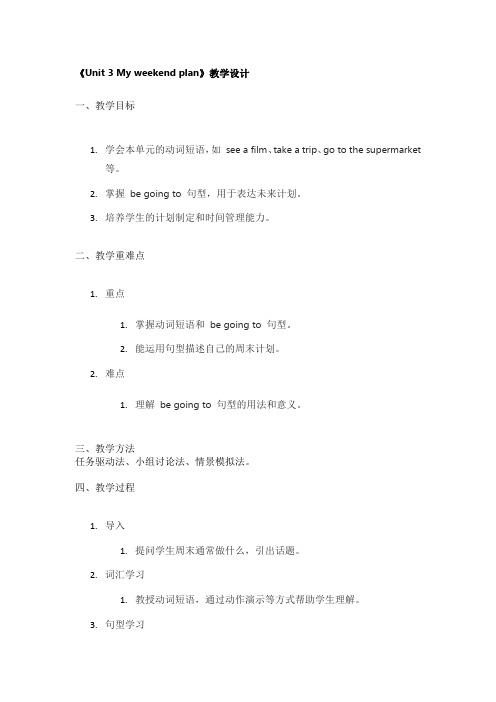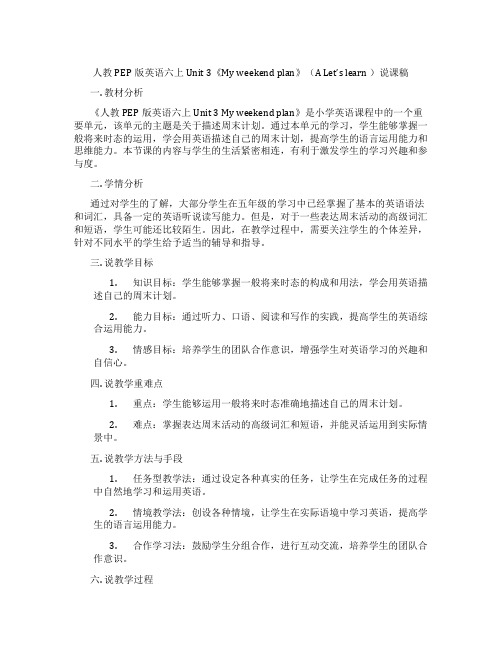Unit 3 My weekend plan 新版教学设计
Unit 3 My weekend plan B Read and write(教学设计)人教PEP

Unit 3 My weekend plan B Read and write (教学设计)一、教学目标1. 语言知识目标1.学生能够认读单词weekend, walk, park, tree, lake, boat, library.2.学生能够听说并理解熟悉表达My weekend plan,我的周末计划。
3.学生能够听说并理解以及说出熟悉词汇weekend, walk, park, tree, lake, boat, library等。
4.学生能够基本地读、写、沟通自己的周末规划。
2. 情感态度目标1.激发学生的学习兴趣,让学生喜欢英语课。
2.让学生珍惜周末的时间,合理安排周末的生活。
3. 学习策略目标1.学会组织口语及阅读材料。
2.学习倾听、口语及阅读策略。
二、教学重点1.学生能够听说并理解以及说出熟悉词汇weekend, walk, park, tree, lake, boat, library等。
2.学生能够基本地读、写、沟通自己的周末规划。
三、教学难点1.学生能够基本地读、写、沟通自己的周末规划。
四、教学过程时间内容活动安排5分钟复习教师观察学生平时的学习情况,与学生交流,了解学生今天的状态以及情绪。
10分钟新词及读音1. 教师播放weekend, walk, park, tree, lake, boat, library的发音,鼓励学生跟着读,由老师指名几位学生读出来,加深记忆。
2.教师文字、图片、手势等多种方式展示新词,让学生在趣味中认识新词。
20分钟语言表达1. 教师模拟表达:“I like to walk in the park. I can see thetree and the lake. I can r ide a boat.”。
学生跟读,锻炼语音语调。
2. 听音找出动词和名词,并进行口语表达。
30分钟写作 1. 引导学生分享自己的周末计划,并开始写下来;2. 教导学生使用课堂学到的单词和句型,输出周末计划,遵守用自己的话来书写。
人教PEP版英语六上《Unit 3 My weekend plan》word第四课时教案

人教PEP版英语六上《Unit 3 My weekend plan》word第四课时教案一. 教材分析人教PEP版英语六上《Unit 3 My weekend plan》word第四课时教案主要围绕周末计划展开。
通过本节课的学习,学生能够掌握关于周末计划的词汇和句型,并能够运用所学知识进行简单的交流和表达。
教材通过丰富的情境和任务型活动,激发学生的学习兴趣,提高学生的语言运用能力。
二. 学情分析sixth-grade students have already acquired some basic English vocabulary and grammar knowledge, and they are able to communicate in English on some dly topics. However, they may still have difficulty in using English to talk about theirweekend plans, so teachers need to guide them to practice and master this knowledge.三. 教学目标1.Knowledge objective:Students are able to listen, speak, read and write the key words and sentence patterns about weekend plans.2.Ability objective:Students are able to use the learned words and sentence patterns to talk about their weekend plans.3.Emotional objective:Students’ interest in English learning is cultivated and their confidence in using English is enhanced.四. 教学重难点1.Key point:The correct use of the key words and sentence patterns about weekend plans.2.Difficult point:The sentence structure “What do you usually do on …? I usually …” and the expression of frequency.五. 教学方法1.Audio-visual teaching method:Using pictures, videos and other teaching ds to create a visual and auditory learning environment.2.Task-based teaching method:Organizing students to participate in various tasks and activities, stimulating their interest in learning and improving their language ability.3.Cooperative learning:Encouraging students to work together in groups, promoting communication and cooperation among students.六. 教学准备1.Teaching materials:Pictures, videos, worksheets, etc.2.Teaching equipment:Projector, computer, whiteboard, etc.七. 教学过程1.Introduction (5 minutes)a.Greeting and warm-upb.Review the previous knowledge2.Presentation (10 minutes)a.Show pictures and ask questions to lead students to guess the topic ofthe lessonb.Introduce the new words and sentence patterns related to weekendplans3.Practice (15 minutes)a.Ask students to read and practice the new words and sentencepatternsb.Conduct role-playing activities among students, using the new wordsand sentence patterns4.Consolidation (10 minutes)a.Ask students to make a list of their weekend plans and share withtheir partnersb.Invite some students to give a presentation about their weekend plans5.Extension (5 minutes)a.Ask students to think about the questions: “What do you usually do onholidays? What do you want to do in the future?” and discuss with theirpartnersb.Share the answers with the class6.Summary (5 minutes)a.Ask students to summarize what they have learned in this lessonb.Teacher makes necessary supplements and emphasizes theimportance of practicing English in dly life7.Homework (5 minutes)a.Ask students to write a short passage about their weekend plansb.Ask students to practice the new words and sentence patterns withtheir parents or friends8.Blackboard (5 minutes)a.Write the key words and sentence patterns on the blackboard forstudents to refer tob.Remind students to review the lessons regularlyNote: The time allocation in this lesson plan is for reference only, and the actual teaching process may vary depending on the actual situation.针对以上教案对教学情境和教学活动的分析:一、教学情境本节课以学生熟悉的周末计划为话题,通过情境创设,激发学生的学习兴趣。
Unit 3 My weekend plan(说课稿)人教PEP版英语六年级上册

Unit 3 My weekend plan一、教学目标1.学习并掌握有关周末计划的基本日常用语。
2.通过听、说、读、写的训练,让学生能够准确地表达自己的周末计划。
3.通过本单元的学习,培养学生的交际能力。
二、教学重点1.掌握并运用本单元的词汇和日常用语2.掌握并运用实用语法,如一般现在时和情态动词can。
3.通过阅读、听力和口语训练,提高学生的阅读与听说能力。
三、教学难点1.运用一般现在时和情态动词can来表达周末计划。
2.让学生学会提出问题和回答问题的方法。
四、教学方法1.听力训练法,通过听力来训练学生的听力和口语表达能力。
2.阅读训练法,通过阅读来提高学生的阅读能力。
3.口头交流法,通过交流来训练学生的口语表达能力。
五、教学过程第一节环节首先向学生介绍本单元的主题,并通过演示让学生熟悉有关的日常用语。
比如我们可以这样问学生:1.What do you usually do on weekends?2.Do you have any plans for this weekend?教师自己可以先以自己的周末计划为例,并且逐一展示出关键词汇,如go shopping,visit grandparents等。
第二节环节接下来,介绍本单元的语法部分:一般现在时和情态动词can。
我们可以通过问题的形式来引导学生:1.简单的句子练习:What do you do on the weekends? - I play football.What does he do on the weekends? - He watches TV.What does she do on the weekends? - She visits her grandparents.2.一般现在时加can:Can you swim? - Yes, I can.Can he sing? - No, he can’t.Can she dance? - Yes, she can.3.以can为主语的句子:Can we go to the park together? - Sure, that sounds great.Can he come to my house this weekend? - Sorry, he can’t. He has other plans.第三节环节接下来,将语法和实际应用相结合,让学生运用所学的知识来描述自己的周末计划。
人教PEP版六年级英语上册《Unit3Myweekendplan第2课时》教学设计

人教PEP版六年级英语上册《Unit 3 My weekend plan第2课时》教学设计一. 教材分析《人教PEP版六年级英语上册》Unit 3主要让学生学会描述自己的周末计划。
本节课是第二课时,主要让学生通过听、说、读、写等多种方式,进一步巩固和拓展描述周末计划的语言知识。
教材内容主要包括一个关于周末计划的故事,以及相关的语言实践活动。
二. 学情分析六年级的学生已经具备了一定的英语基础,能够听懂并基本表达简单的日常生活中的事物和事件。
但他们在语言运用方面还存在一定的困难,如句子结构的掌握、词汇的运用等。
因此,在教学过程中,需要关注学生的个体差异,因材施教,尽量让每个学生都能参与到课堂活动中来。
三. 教学目标1.知识目标:学生能够听懂、会说、会读、会写关于周末计划的相关词汇和句子。
2.能力目标:学生能够运用所学知识,简单描述自己的周末计划。
3.情感目标:培养学生热爱生活,合理安排时间的良好习惯。
四. 教学重难点1.重点:学生能够听懂并运用本节课所学词汇和句子描述周末计划。
2.难点:学生能够正确运用所学知识,灵活描述自己的周末计划。
五. 教学方法1.任务型教学法:通过设置各种任务,让学生在完成任务的过程中,自然地学习和运用所学知识。
2.情境教学法:创设生活情境,让学生在真实的环境中,感受和体验语言的运用。
3.分组合作学习:将学生分成小组,鼓励学生互相交流、讨论,提高学生的参与度和积极性。
六. 教学准备1.教材:《人教PEP版六年级英语上册》Unit 32.课件:与本节课内容相关的PPT课件3.教学资源:与周末计划相关的图片、视频等4.练习题:针对本节课内容的练习题七. 教学过程1.导入(5分钟)利用图片或视频,引导学生谈论自己喜欢的周末活动,激发学生的学习兴趣。
2.呈现(10分钟)展示教材中的故事,让学生听懂并理解故事内容。
然后,引导学生用中文复述故事情节。
3.操练(10分钟)让学生分组,进行角色扮演,模拟故事中的场景,练习故事中的句子和词汇。
Unit3Myweekendplan第二课时(教案)人教PEP版英语六年级上册

二、教学难点:
运用含有be going to的问答句简单地谈论周末计划。
教学过程(微课语音与PPT脚本,不超过15分钟)
教学流程
脚本内容
1.提示
课题
P1-P2主题页
1.Greeting
2.Free talk
【设计意图】:,师生问候,拉近彼此距离,激发学生主动学习的热情。介绍英语学习好习惯,提示学生做好学习准备;揭示课题。
2.能在情境中正确运用核心句型What are you going to do? I’m going to ...来对关于计划的相关动作进行问答。
3.能够熟读并理解课文文本,并根据所学文本创编对话。
二、文化意识目标:
能初步了解英语国家的简单文娱活动和度假及周末的主要活动方式。
三、思维品质目标:
通过分享周末计划,培养学生学会与人交往,善于与他人交流与合作的能力。
学 科
英语
年 级
六年级
课 题
Unit3 My weekend Plan(Lesson2)
教材版本
书名:人教版小学英语(三年级起点)
执教教师
教学目标
一、语言能力目标:
1. 能听、说、认读单词和短语:lesson,tomorrow, see a film,visit my grandparents, see a film.
2
情景
导入、
激活
旧知
P3-4
图片
游戏引入,动词短语复习
1.Task1:Magic eyes
T: If you can read it, please stand up and read it out loud.
2.Task 2: Share your plan.
《Unit 3 My weekend plan》教学设计

《Unit3My weekend plan》教学设计
一、教学目标
1.学会本单元的动词短语,如see a film、take a trip、go to the supermarket
等。
2.掌握be going to句型,用于表达未来计划。
3.培养学生的计划制定和时间管理能力。
二、教学重难点
1.重点
1.掌握动词短语和be going to句型。
2.能运用句型描述自己的周末计划。
2.难点
1.理解be going to句型的用法和意义。
三、教学方法
任务驱动法、小组讨论法、情景模拟法。
四、教学过程
1.导入
1.提问学生周末通常做什么,引出话题。
2.词汇学习
1.教授动词短语,通过动作演示等方式帮助学生理解。
3.句型学习
1.讲解be going to句型,举例说明用法。
4.小组活动
1.小组讨论周末计划,并用be going to句型进行汇报。
5.情景模拟
1.模拟周末活动场景,让学生进行对话练习。
6.总结
1.总结周末计划的表达和时间管理的重要性。
7.作业
1.写一篇自己的周末计划作文。
Unit 3 My weekend plan 新版教学设计

教学设计1. Show the students some pictures and ask: What are these holidays?National Holiday Spring Festival ChristmasWhat do your family do on these holidays? Give them some hints and choose:Set fire works go shopping get together buy presents have a big dinner.2. While reading(1) Show t hem another picture of “Mid-autumn Festival”What holiday is it?What do your family do on this holiday?(2 )Read and answer.教师This is Wu Yifan’s diary. Let’s read the diary.教师课件呈现以下问题:What are Wu Yifan’s family going to do?学生阅读后对问题His family will get together.讲解will = be going to(3)Read and finish the table.What are Wu Yifan and Robin going to do?What is Wu’s aunt going to do?What is Wu’s grandma going to do?(4) Check the answers1. 课文朗读(Listen and Read)(1) Have Ss listen to the tape.Tips: 仔细听录音,体会录音中的升降调、重音和意群的停顿。
(2) Listen again and read after the tape..Tips: 听录音跟读, 听一听单词:lesson dinner tonight tomorrow语音指导:单词的重音(3) 重点指导PoemF is for family. A is for autumn. M is for moon. I is for “I”. L is for love. Y is for you.Who can read it beautifully.(4) Read the whole poem in pairs.2. 课本个性化书写活动(1) Discuss with your partner. What are you going to do for Mid-autumn Festival?先让学生同桌口头交流。
人教PEP版英语六上Unit3《Myweekendplan》(ALet’slearn)说课稿

人教PEP版英语六上Unit 3《My weekend plan》(A Let’s learn )说课稿一. 教材分析《人教PEP版英语六上Unit 3 My weekend plan》是小学英语课程中的一个重要单元,该单元的主题是关于描述周末计划。
通过本单元的学习,学生能够掌握一般将来时态的运用,学会用英语描述自己的周末计划,提高学生的语言运用能力和思维能力。
本节课的内容与学生的生活紧密相连,有利于激发学生的学习兴趣和参与度。
二. 学情分析通过对学生的了解,大部分学生在五年级的学习中已经掌握了基本的英语语法和词汇,具备一定的英语听说读写能力。
但是,对于一些表达周末活动的高级词汇和短语,学生可能还比较陌生。
因此,在教学过程中,需要关注学生的个体差异,针对不同水平的学生给予适当的辅导和指导。
三. 说教学目标1.知识目标:学生能够掌握一般将来时态的构成和用法,学会用英语描述自己的周末计划。
2.能力目标:通过听力、口语、阅读和写作的实践,提高学生的英语综合运用能力。
3.情感目标:培养学生的团队合作意识,增强学生对英语学习的兴趣和自信心。
四. 说教学重难点1.重点:学生能够运用一般将来时态准确地描述自己的周末计划。
2.难点:掌握表达周末活动的高级词汇和短语,并能灵活运用到实际情景中。
五. 说教学方法与手段1.任务型教学法:通过设定各种真实的任务,让学生在完成任务的过程中自然地学习和运用英语。
2.情境教学法:创设各种情境,让学生在实际语境中学习英语,提高学生的语言运用能力。
3.合作学习法:鼓励学生分组合作,进行互动交流,培养学生的团队合作意识。
六. 说教学过程1.热身(5分钟):通过与学生谈论日常话题,如天气、学校活动等,激发学生的英语学习兴趣,营造轻松愉快的课堂氛围。
2.导入(10分钟):教师展示一张自己的周末计划照片,引导学生用英语描述照片中的活动。
学生分组讨论,分享彼此的想法和计划。
3.新课呈现(15分钟):教师通过多媒体课件展示本节课的主要内容,包括一般将来时态的构成和用法,以及描述周末活动的词汇和短语。
- 1、下载文档前请自行甄别文档内容的完整性,平台不提供额外的编辑、内容补充、找答案等附加服务。
- 2、"仅部分预览"的文档,不可在线预览部分如存在完整性等问题,可反馈申请退款(可完整预览的文档不适用该条件!)。
- 3、如文档侵犯您的权益,请联系客服反馈,我们会尽快为您处理(人工客服工作时间:9:00-18:30)。
教学设计
1. Show the students some pictures and ask:
What are these holidays? National Holiday Spring Festival
Christmas What do your family do on these holidays?
Give them some hints and choose: Set fire works go shopping get together
buy presents have a big dinner.
2. While reading (1) Show t hem another picture of “Mid-autumn
Festival”
What holiday is it?
What do your family do on this holiday?
(2 )Read and answer. 教师This is Wu Yifan’s diary. Let’s read the
diary.
教师课件呈现以下问题:What are Wu Yifan’s family going to do?
学生阅读后对问题
His family will get together.
讲解will = be going to
(3)Read and finish the table.
What are Wu Yifan and Robin going to do?
What is Wu’s aunt going to do?
What is Wu’s grandma going to do?
(4) Check the answers
1. 课文朗读(Listen and Read)
(1) Have Ss listen to the tape.
Tips: 仔细听录音,体会录音中的升降调、重音和
意群的停顿。
(2) Listen again and read after the tape..
Tips: 听录音跟读, 听一听单词:lesson
dinner tonight tomorrow
语音指导:单词的重音
(3) 重点指导 Poem
F is for family. A is for autumn. M is for moon. I
is for “I”. L is for love. Y is for you.
Who can read it beautifully.
(4) Read the whole poem in pairs.
2. 课本个性化书写活动(1) Discuss with your partner. What are you
going to do for Mid-autumn Festival?
先让学生同桌口头交流。
教师将最后一位学生的回答在投影仪下示范书写,然后提出一星和两星要求,请学生个
性化书写。
(2) Write down your plan. For Mid-Autumn Festival, I’m going to _____. My partner is going to __________
___________.。
